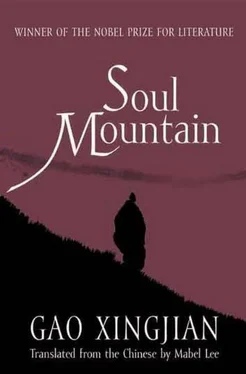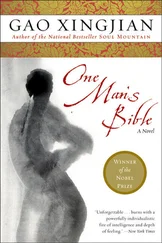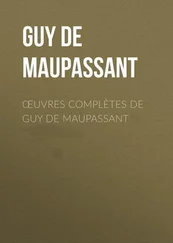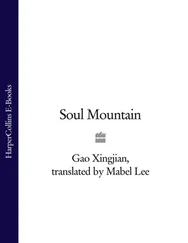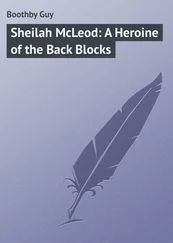1 ...5 6 7 9 10 11 ...121 I wander on in fine drizzling rain. It’s been a long time since I have wandered about in this sort of misty rain. I pass by the Sleeping Dragon Village Hospital, it looks deserted. The forest is quiet but there is always a stream somewhere not too far away, for I can hear the sound of trickling water. It’s been ages since I have had such freedom, I don’t have to think about anything and I let my thoughts ramble. There’s no-one on the highway, and no vehicles are in sight. As far as the eye can see it is a luxuriant green. It is the middle of spring.
The big deserted compound on the side of the road is probably the headquarters of the bandit chief Song Guotai mentioned by the reserve warden last night. Forty years ago, a single mountain road for horse caravans was the only access to this place. To the north it crossed the 5000-metre-high Balang Mountains into the Qinghai-Tibetan highlands and to the south it went through the Min River valley into the Sichuan basin. The opium smugglers from the South and the salt smugglers from the North all obediently put down money here to buy passage through. This was called showing proper respect. If there was a fuss and proper respect wasn’t shown, it would be a case of arriving and not returning. They would all be sent to meet the King of Hell.
It is an old timber compound. The two big heavy wooden gates are wide open and inside, surrounded on three sides by two-storey buildings, is an overgrown courtyard big enough for a caravan of thirty or forty horses. Probably in those days, as soon as the gates were closed, the eaved balconies with their wooden railings would be thick with armed bandits so that caravans thinking of stopping the night would be trapped like turtles in a jar. Even if a shoot-out took place there wouldn’t have been anywhere in the courtyard to escape the bullets.
There are two sets of stairs in the courtyard. I go up. The floorboards creak noisily and I deliberately tread heavily to show my presence. However the upstairs is deserted. One after another I push open the doors to empty rooms smelling of dust and mildew. Only a dirty grey towel hanging on a wire and an old worn shoe show that the place has been lived in, but probably some years ago. When the reserve was established the supply and marketing cooperative, local produce purchasing depot, grain and oil depot, veterinary clinic as well as the village administrative office and the personnel were all relocated in the narrow hundred metres of street built by the reserve administration where there is not a trace of Song Guotai’s hundred or so men and their hundred or so rifles once housed in this compound. In those times they would lie on rush mats smoking opium and fondling their women. These women, who had been abducted, had to cook for them in the daytime and sleep in turn with them at night. At times, either because the loot wasn’t shared equally or because of a woman, fights would break out and wild rioting probably took place on the floors of this very building.
“Only the bandit chief Song Guotai could keep them under control. This fellow was ruthless and cruel, and renowned for his cunning.” The warden of the reserve does political work and he is eloquent and convincing. He says his lectures to university students here for practical work range from protection of the giant panda to patriotism and that his lectures can reduce the women students to tears.
He says that amongst the women the bandits abducted there was even a soldier of the Red Army. In 1936, during the Long March, when a regiment of the Red Army was passing through the Mao’ergai grasslands, one of the battalions was attacked by bandits. The ten or so girls of the laundry detachment were abducted and raped. The youngest was seventeen or eighteen and was the only one to survive. She was passed around several of the bandits and eventually an old Qiang man purchased her to be his wife. She lives in a nearby mountain flatland and can still recite the name of her battalion, regiment and company, as well as the name of her commanding officer who is now an important official. He’s quite excited and says of course he can’t talk about all these things to the students, then goes back to talking about the bandit chief Song Guotai.
This Song Guotai started out as a junior assistant, he says, for an opium merchant. When the merchant was killed by Big Brother Chen, the bandit chief who had taken over the district, he threw in his lot with the new boss. By wheeling and dealing he soon became Big Brother’s confidante and had access to the small courtyard where Big Brother lived at the back of the compound. The small courtyard was later blown up by the Liberation Army in a mortar attack and is now a mass of trees and shrubs. But in those years it was really a Little Chongqing, a replica of the wartime capital, where Big Brother Chen and his harem debauched themselves on sex and liquor. The only man allowed to wait on him was Song Guotai. A caravan arrived from Ma’erkang full of bandits who had been eying this strip of territory where all you had to do was to sit there waiting for the loot to come to you. A fierce battle raged for two days with deaths and injuries to both sides, but before any clear victory or defeat, they held peace negotiations and sealed an agreement in blood. The gates were opened and the other party invited inside. Upstairs and downstairs two lots of bandits joined in finger-guessing games and drinking liquor. Actually it was Big Brother’s plan to get the other side drunk so that he could deal with them swiftly. He got his mistresses to flit about from table to table with their breasts exposed. It wasn’t just the other bandits, who of either side could resist? Everyone was rotten drunk. Only the two bandit chiefs were still sitting upright at the table. As pre-arranged, Big Brother snapped his fingers loudly and Song Guotai came to pour more liquor. In one swift action, faster than it takes to tell this, he snatched the rival bandit chief’s machine gun from the table and one bullet each sent the pair sprawling, Big Brother included. Then he asked: Anyone who doesn’t want to surrender? The bandits looked at one another, not one dared to utter so much as half a murmur of dissent. Song Guotai thereupon moved into Big Brother’s little courtyard and all the mistresses came into his possession.
He tells all this with great drama, he isn’t boasting when he says he has the women students in tears. He goes on to say that in 1950 they came into the mountains to exterminate the bandits. The little courtyard was surrounded by two companies of soldiers. At daybreak they shouted to the bandits to put down their weapons, change their wicked ways and reform, and warned that there was a blockade of several machine guns at the main gate so no-one should try to escape. It’s as if he’d taken part in the battle himself.
“What happened then?” I ask.
“At first they stubbornly resisted so the little courtyard was bombarded with mortar. The surviving bandits threw down their guns and came out to surrender. Song Guotai was not amongst them. When a search was made of the little courtyard they only found a few weeping women huddled together. Everyone said the house had a secret tunnel which went up into the mountain but it was never found, and he has never shown up anywhere. It’s over forty years now, some say he’s still alive and others say he’s dead but there’s no real evidence, only theories.” He sits back into the round cane chair and tapping his fingers on the edge where his hands are resting, he begins to analyse these theories.
“There are three theories about what happened to him. One is that after escaping he fled to another area, changed his name, and settled somewhere to work in the fields as a peasant. The second is that he could have been killed in the gun fight but the bandits wouldn’t admit to it. Bandits have their own set of rules — they may be embroiled in a terrible fight amongst themselves but they won’t divulge anything to an outsider. They have their own ethics, a code of bandit chivalry if you like, and yet on the other hand they are cruel and wicked. Bandits have two sides to them. The women had all been abducted but once they came into his lair, they became a part of the gang. They were abused by him and yet kept secrets for him.” He is shaking his head not because he finds it incomprehensible but because he is moved by the complexity of the human world, it seems.
Читать дальше
Конец ознакомительного отрывка
Купить книгу
